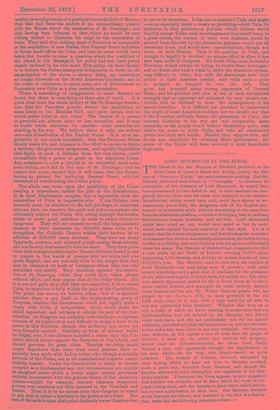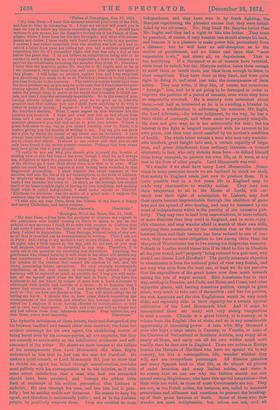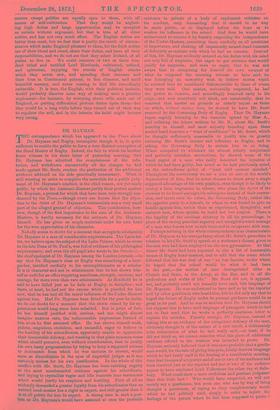LORD MONMOUTH IN THE FLESH.
THE letters of the late Marquis of Hertford produced in the Irish Court of Queen's Bench last Friday, during the libel case of " Stannus v. Finlay," are most instructive reading. Had Mr. Disraeli published such letters in " Coningsby " to illustrate his conception of the character of Lord Monmouth, he would have been pronounced to have failed in art, to have confused too com- pletely his own ideas with the ideas that belonged to his creation. No aristocrat, critics would have said, could have shown so un- consciously, yet so fully, the dangerous side of the English aris- tocratic or plutocratic spirit, without descending at the same time from the aristocratic position,—without betraying, that is, ordinary had instincts, temper, brutality, and self-will. Lord Monmouth might have acted so, nay, would have acted so, but he never would have exposed his inner character in that style. Yet it is certain that the letters are genuine, and that the singular revelation of character they involve was entirely unconscious, the writer having no idea of publicity, and only chatting with his agent confidentially about his estate. The Marquis of Hertford had, it appears, in 1852 a vast estate in the North of Ireland, covering 60,000 acres, supporting 3,000 tenants, and yielding an annual income of some £62,000 a year. The Marquis—said to have been the original of Lord Monmouth—an easy-going man of pleasure, with much artistic knowledge and a good deal of kindness for the professors of art, with some regard, it would seem, for natural ties, but other- wise utterly Epicurean, passed his life in Paris doing as he liked, never visited Ireland, and managed his estate entirely through Dean Stannus and his son, Mr. Walter Stannus, people who are alleged by the Northern Whig to have governed in the old Irish way,—that is to say, with a high hand for all who in any way questioned their authority. Whether that were so or not, a point of which we know nothing, it seems clear that the highhandedness was not ordered by the Marquis, who did not exact rack-rents, and did not particularly care for his agent's
authority, provided only that the income came in, and that the rose- leaves under him were never in any way crumpled. On one occa- sion, however, he did signify a sort of wish that the people of Lisburn, a town on the estate and entirely his property, should elect the Advocate-General, for whom Lord Derby wanted a seat, and apparently thought the signification of his wish, which—by the way, was illegal—would be quite sufficient. The tenants of Lisburn, however, instigated by some feeling which we have not time to discover, revolted, made a great riot, wounded Dean Stannus, and elected Mr. Smythe, afterwards Lord Strangford, the opponent of the Mar- quis's nominee. Thereupon the Dean appears to haie suggested that Lisburn was underlet, and to have raised the rents or pro- posed raising them, and the tenants in great alarm asked permis-
sion to send a deputation to their lord. The Marquis, annoyed at the fuss and the failure, and horrified at the idea of a deputa- tion, wrote the two following inimitable letters :—
"Palace of Compiegne, Dec. 27, 1852.
"My dear Dean,—I have this moment received your letter of the 24th, and lose no timo in answering it. I hope my answer will reach you in time for you to follow my desires respecting the petition. 'should have written to you sooner, but the Emperor invited me to his Palace of Com- piegne, where I have been for the last fortnight ; and, what with amuse- ments and duties, I have really only found time to write to my mother. I confess I was rather surprised that the election was lost, as I had re- ceived a letter from your son telling me you had a certain majority of something like 20, if I remember right, and that was only a day or two before the great day. I do not believe in intimidation being able to be carried to such a degree in so very respectable a town as Lisburn as to prevent the inhabitants returning the member they think fit ; therefore, I infer that the majority prefer Mr. Smythe to Mr. Inglis, and, as far as I am concerned, they may keep him, and name him again and again if they please. I will lodge no petition against him, and I am surprised you should say you mean to do so on Thursday (which is to-day), unless you hear from me to the contrary. The contrary course would have been the most prudent one, as you may be quite sure that if Ihad intended peti- tioning against Mr. Smythe's return I should have begged you to have taken the proper steps to arrive at the result that you seem to think cer- tain, and that I consider extremely improbable. So, in the event of your having already lodged the petition, pray be so good as to take the greatest care that neither you nor I shall have anything to do with it either in name or money. I repeat it ; I will lodge no petition against Mr. Smythe's election. What I most regret in this business are the injuries you received. I hope and trust you feel no bad effects from them, and I can assure you that you would have done me the very greatest pleasure if you had told me so in your last letters. I have a great deal more to say, but as you intend running over to Paris, it is useless giving you the trouble of writing to me. You say you can show me a plan by which the rental of my estate can be increased. I have always been told that it could, and have even had different plans sent to me to attain that object. It seems to me rather odd that you should only have found it out on the present occasion. Perhaps this very event may have given rise to your project.
"I really do not see why you should give yourself the trouble of coming over at this bad time of the year, though I shall be, as I always am, delighted to have the pleasure of seeing you. As far as the details of the election go, I care little about them now that it is over. What pains me more than I can express is your having been wounded in that disgraceful proceeding. I shall require the exact expense of the election, and also the list of all my subscriptions to the town of Lisburn, in whatever shape they may be ; likewise the gardens, houses, and lands I can increase the rents of. In short, as the borough has availed itself of its incontestable right of having its own candidate, and making itself what is called independent, I shall make myself so likewise.
Kindness for kindness' was the motto of a great man—I suppose the contrary may be resorted to when necessary.
"I wish you, my dear Dean, from the bottom of my heart, a happy and merry Christmas, and many returns.
"Yours sincerely, HERTFORD."
" Boulogne, Hotel des Being, Jan. 11, 1853.
"sly dear Dean,—Pray have the goodness to express my regrets to the gentlemen who intend coming to Paris to speak to me on the subject of any measure I think fit to take with respect to Lisburn that I am sorry I cannot have the honour of receiving them. In the first place, I object to deputations. They derange, without being of any use, as all that is required can be communicated in writing. Then I am not in Paris ; and, owing to my mother's very severe illness, I often sit up all night, take a little repose in the day, and do not feel, as you may well suppose, inclined to be disturbed in any way. Therefore, it is quite out of the question my receiving any deputation. Anything the gentlemen who intend forming it will write to me about will receive my best consideration. I have received a letter from Mr. Ingliss, giving me his opinion of the reasons that caused his election to fail, and his views concerning future operations. He very strongly recommends conciliation, as the best means of recovering lost ground. I hope harmony will be restored as much as possible, but I beg you will main- tain all we agreed upon when we last met in Paris. Pray have the kindness to let me know, by return of post, how a Lord-Advocate is addressed both inside and outside of a letter. It so happens that I never had occasion to write. I do not know whether one says My lord,' or Sir,' nor how one directs to him. You will much oblige me by letting me know. I should like to hear some details respecting the consequences of the election, and whether tho borough appears to be elated (as I suppose it is) at having effected its independence, as they call it—not very improperly. I hope and trust you will no longer feel any bad effects from your infamous treatment. Pray believe me, my dear Dean, yours most sincerely, HERTFORD."
The Sybarite selfishness of those letters, their cool disregard of any tie between landlord and tenant other than contract, the faint but evident contempt for his own agent, the shuddering horror of being bored even by his income-payers, all are exquisite, but they are scarcely so noteworthy as the intellectual acuteness and self- command of the writer. He shows no more temper at the failure of his arrangements than Lord Monmouth did when Rigby announced to him that he had lost the seat for Dartford. He makes a quiet remark, as Lord Monmouth did, just to show that he thinks his agent has failed through miscalculation, condoles most politely with his correspondent as to his injuries, as if with some secret satisfaction that a man who had not succeeded should have been punished, and betrays the oddest little flash of contempt at his sudden perception that Lisburn is underlet. He sees through his man, and lets him feel it. pain- fully ; but he neither scolds nor threatens. He means to keep his agent, and therefore is sardonically polite ; and as to the Lisburn people, lie positively respects them. They are entitled to their independence, and they have won it by frank fighting, the Marquis repudiating the pleasant excuse that they were intimi- dated by the adversary. No; they liked Mr. Smythe better than Mr. Inglis, and they had a right to like him better. They must be punished, of course, if only because one should always hit back, and because it is a pleasure to make power felt, particularly from a distance ; but he will have no self-deception as to the motive of punishment, and no blame cast upon that "moat respectable town," and above all, no deputations. That is too horrifying. If a thousand or so of tenants have revolted, rents must be raised, but the Marquis neither hates them enough to scold them or insult them, nor likes them enough to listen to their complaints. They have done as they liked, and were quite right in doing it, and must just take the consequences of their action. They may write, if they like, of course, but interviews " derange " him, and he is not going to be deranged in order to improve the position of a parcel of tenants, even when they have so respectably revolted. He is scarcely even interested about them,—not half so interested as he is in avoiding a blunder in etiquette, a misdirection in addressing his nominee, Mr. Inglis, the Lord Advocate,—for whose judgment, by the way, he has a faint shade of contempt, and whose name he purposely misspells. He does not give way, he is too aristocratic for that ; but his interest in the fight is languid compared with his interest in his own peace, just then very much assailed by his mother's condition of health. The whole letter reveals a man who uses very consider- able intellect, great insight into men, a certain capacity of large- ness, and great detachment from ordinary interests—a trained aristocrat, in fact, who only shrinks from bore—to defend himself from being annoyed, to protect his own life, as it were, at any cost to the lives of other people. Lord Monmouth was real.
We wonder if we shall have many Lord Monmouths. Some- times in more pessimist moods we are inclined to think we shall, that society in England tends just now to produce them. It is quite possible that in a few years life in England may be made very unattractive to wealthy nobles. They may lose their temptation to sit in the House of Lords, will cer- tainly lose their right of nomination to Lisburn, may find their sports become impracticable through the abolition of game laws and the spread of wire fencing, and may be harassed by the want of independence which is the penalty of our excessive pub- licity. They may care to lead lives more studious, or more refined, or more dissolute than they could in England, and in more enjoy- able climates, and may wander afield in search of their own wills, satisfying their consciences by the reflection that as the relation between them and their tenants has been reduced to one of con- tract, they have no more obligation to live among them than the Marquis of Westminster has to live among his Belgravian tenantry. Nobody in London would blame him if he liked to live in Cheshire all the year round, and " property" being reduced to a quit-rent, why should one blame Lord Hertford ? The purely economic objection to absenteeism is from the national point of view very foolish, and not very wise even from the local one, at least we do not perceive that the expenditure of the great house ever does much towards raising the rate of wages around. Rich Americans live in that way, settling in Dresden, and Paris, and Rome, and Como, and other enjoyable places, and leaving American politics, except in great crises, very much to take care of themselves ; and but f or politics, the rich American and the rich Englishman would be very much alike, and especially alike in their capacity for a certain cynical cultivation of the Lord Monmouth kind. And it must be remembered there are many and very strong temptations to such a course. Climate is a great luxury, so is scenery, so is release from the English idea of state, and so is any considerable opportunity of exercising power. A man with fifty thousand a year who buys a large estate in Tuscany, or Venetia, or some of the Cantons of Switzerland or Southern Austria, may enjoy all or nearly all these, and carry out all his own wishes much more readily than he does now in England. There are nobles in Europe besides the Marquis of Hertford who have no special tie to any country, but live a cosmopolitan life, wander whither they will, and are everywhere personages. All Russian grandees and many Spanish tend to that life, as do almost all princes of cadet branches, and many Italian nobles, and there is no reason that we can see why the fashion should not also spread among Englishmen, who have this special temptation—that their wills are valid, as those of most Continentals are not. They are not, as the Dutch nobles, for instance, are, called to incessant precautions and alliances and exertions to prevent the breaking- up of their great fortunes at death. Some of those who thus wander are mere voluptuaries, but others are not, and all careers except politics are equally open to them, with all means of self-cultivation. That they would be neglect.. ing high duties and large opportunities may be accepted as certain without argument, but that is true of all other nobles, and has not very much effect. The English nobles are better than most, but we fear that is partly the result of circum- stances which make England pleasant to them, for the Irish nobles are of their blood and creed, share their duties, and have all their responsibilities, and we do not see that they select Ireland, of all places, to live in. We could conceive of two or three hun- dred titled and untitled Lord Hertfords, cultivated, refined, and epicurean, enjoying the rentals of English estates which they never saw, and spending their incomes and their lives in Continental palaces, in fine climates, and amid beautiful scenery, and never ceasing to find life exceedingly endurable. It is true, the English, with their political instinct, would probably discover some way of making such a practice unpleasant—for instance, by worrying about wills made out of England, or patting differential probate duties upon them—but they would be a long while before they turned out of their way to regulate the evil, and in the interim the habit might become very strong.




































 Previous page
Previous page